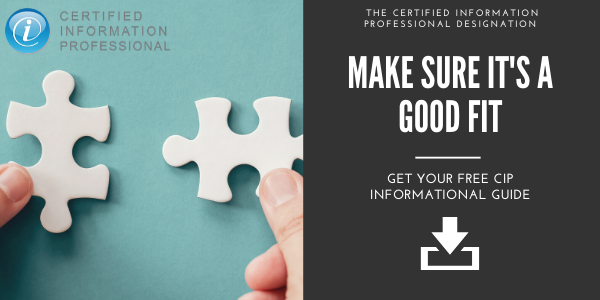
CIP Spotlight: Elizabeth Croom on eCourts and Getting Certified
Certified Information Professional (CIP)

As part of our Certified Information Professional Spotlight series, I recently sat down with Elizabeth Croom, Assistant Legal Counsel for a state’s Administrative Office of the Courts. We chatted about why she chose to get certified and the best ways to prepare for the exam.
Jesse: Hi, Elizabeth. Thank you for chatting with me today. Let’s begin by talking about your role in an Administrative Office of the Courts. I expect good recordkeeping is a critical part of your job.
Elizabeth: As Assistant Legal Counsel, I have a number of information-intensive responsibilities, including contributing to our eCourts initiatives and projects, electronic recordkeeping, enterprise content management, and policy development and drafting. My job requires me to have a detailed understanding of privacy law and the managing of public records.
Jesse: You became a Certified Information Professional this past spring. What made you decide the CIP was right for you?
Elizabeth: I first heard about the CIP from our CIO. I was, and still am, working on our state’s eCourts initiatives, which include building an eFiling and electronic case management system. I want to be a meaningful contributor to these projects. Preparing for the CIP helped bring me up to speed on managing our records in the digital age.
Jesse: A paperless court - that sounds like a really great set of projects. Are you working on any other projects at the moment?
Elizabeth: Of course! I’ve also been involved in the deployment of an enterprise information management system and writing an Electronic Records and Imaging Policy, which is required (and must be approved) by State Archives.
Preparing for the CIP has helped me with my work on:
- A taxonomy for our EIMS
- Access controls
- File-naming conventions
- Hashing requirements
- When to declare documents as records
- Digital signature requirements
- Policies for instant messaging, scanning, protecting sensitive information, business continuity/disaster recovery, etc.
- Cloud procurement terms
- Transmission and storage of sensitive information
- Developing new retention/disposition schedules for digital recordings
Jesse: Now that you’re a Certified Information Professional, what's changed?
Elizabeth: Becoming a CIP has helped me gain the confidence of our IT department by speaking and understanding their language, and I am successfully giving legal advice as our court system goes digital.
Jesse: Final question, what advice would give someone who is starting to prepare for the CIP exam? Are there any resources you found particularly helpful?
Elizabeth: The test is hard and requires serious preparation, but AIIM is a great source of training and knowledge. I recommend studying the CIP Prep Guide. If you can, I’d also suggest taking the CIP Prep Course.
Jesse: Thank you so much, Elizabeth! It was great chatting with you. Best of luck on your eCourts initiatives and all of the other projects you’re working on.


![[Informational Guide] Is certification right for you? Get this free CIP Exam Guide to find out.](https://no-cache.hubspot.com/cta/default/332414/dcb32a30-373b-4f1b-9d7f-90425213921c.png)
